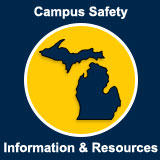Featured Stories
-
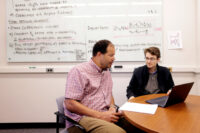
Seeing electron movement
Dec 26, 2022The key to maximizing traditional or quantum computing speeds lies in our ability to understand how electrons behave in solids, and a collaboration between the University of Michigan and the University of Regensburg captured electron movement in attoseconds—the fastest speed yet.
Learn more about this research -
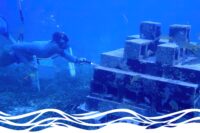
Rebuilding Coastal Ecosystems
Dec 19, 2022LSA assistant professor Jacob Allgeier studies how nutrients and energy cycle through tropical ecosystems in order to better manage fisheries. The artificial reefs he’s building are an inexpensive, effective way to sustainably improve fisheries’ productivity. It’s important work, Allgeier says, “because people are hungry. It’s really that simple.”
Learn more about this project -
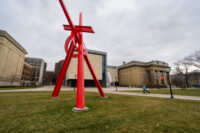
‘Tis the season
Dec 12, 2022The University of Michigan and the city of Ann Arbor always have something to see, hear or visit. If you find yourself in the area during the holidays, enjoy one of the many exhibitions and events taking place over the next month.
View the December exhibitions & events -

Cyber vulnerability
Dec 5, 2022A new attack discovered by the University of Michigan and NASA exploits a trusted network technology to create unexpected and potentially catastrophic behavior. The technology is widely used in critical infrastructures such as spacecraft, aircraft, energy generation systems and industrial control systems.
Learn more about this vulnerability -

Healthy schools
Nov 28, 2022Project Healthy Schools is a community and U-M collaboration designed to reduce childhood obesity and improve the current and future health of Michigan's youth.
Learn more about this project -
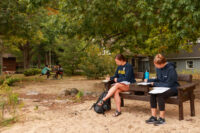
Management as a calling
Nov 21, 2022University of Michigan Ross professor, Andy Hoffman, recently took a cohort of business students to U-M’s Biological Station on Douglas Lake in Northern Michigan. The goal for the lakeside retreat: to remove distractions, encourage reflection, and embrace a moral compass to explore professions that promote commerce and serve society.
Learn more about this retreat -
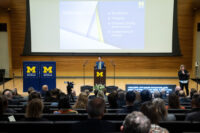
Leadership address
Nov 17, 2022At his first Leadership Welcome, President Santa J. Ono shared details about the strategic vision that will define the first few years of his presidency. He outlined transformative initiatives ranging from efforts to amplify U-M’s research and scholarship activity to new opportunities for staff development; and from new sustainability developments to socially conscious investing.
Learn more about President Ono's vision -
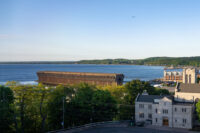
Great Lakes Climate Migration
Nov 14, 2022Communities in the Great Lakes region need to start planning now for a future that may include “climate migrants” who leave behind increasingly frequent natural disasters in other parts of the country. And user-friendly web-based tools can be a central part of that planning process.
Learn more about the study -
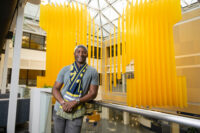
Student veteran
Nov 7, 2022When John Brown was researching master of business administration programs, there were three key factors that he was weighing: “culture, credibility, resources.” For Brown, who’s still active with the Marine Corps, “culture was going to be the defining factor” in ultimately selecting the Ross School of Business to pursue an MBA.
Read The Story -
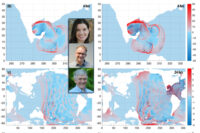
Dinosaur-killing asteroid
Oct 31, 2022Three generations of U-M scientists studied the tsunami caused by a dinosaur-killing asteroid impact. The team presented the first global simulation of the Chicxulub impact tsunami to be published in a peer-reviewed scientific journal.
Learn more about the simulation -

Imperiled coral reefs
Oct 24, 2022Coral reefs are being impacted by myriad stressors leading to drastic changes to their structure and function. Fishes play essential roles in driving ecosystem processes on coral reefs but the extent to which these processes are emergent at temporal or ecosystem scales is poorly understood. A new study provides compelling new evidence that fish don’t regulate coral over time.
Learn more about this study -
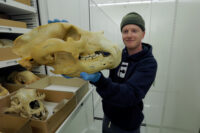
Creature feature
Oct 18, 2022U-M alumnus Charlie Engelman has amassed 1.6 million followers on TikTok with his wildly entertaining take on slimy and sublime dead creatures. He informs his audience with fun facts utilizing U-M’s research collections as he teaches his way around jars full of spiny fish, blood-sucking sea creatures, and more.
Learn more about Odd Animal Specimens -
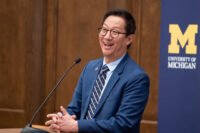
The Ono era begins
Oct 14, 2022Santa J. Ono, the University’s 15th president, says, ‘My most important first job is to listen to the community. They understand what's special about Michigan and that has to inform what I'm going to do.’
Learn more about U-M's new leader -
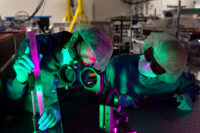
ZEUS laser
Oct 10, 2022The laser that will be the most powerful in the U.S. is preparing to send its first pulses into an experimental target at U-M. Called ZEUS, the Zetawatt-Equivalent Ultrashort pulse laser System, it will explore the physics of the quantum universe as well as outer space, and it is expected to contribute to new technologies in medicine, electronics and national security.
Learn more about ZEUS -
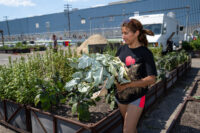
From garden to growth
Oct 3, 2022Raquel Garcia, executive director for Southwest Detroit Environmental Vision, said the long-standing relationship between U-M and SDEV has helped to support the garden through grants, plants from the Campus Farm and technical support.
Learn more about Cadillac Urban Gardens -
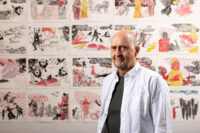
Cosmic Dust
Sep 26, 2022Professor Jim Cogswell’s adhesive vinyl installations have delighted the U‑M community and visitors to our campus for years. In 2022, Cogswell brings these explorations to international audiences in Athens, Greece and Santo Tirso, Portugal with two site-specific installations.
Learn more about these installations -

Victors for Veterans
Sep 19, 2022Over the past decade, students and faculty from the U-M School of Dentistry have provided free dental care valued at about $1.7 million to more than 480 veterans throughout the state of Michigan. The Victors for Veterans clinics, or V4V, are providing a much-needed service because the military doesn't cover dental treatments for most veterans.
Learn more about the V4V clinics -
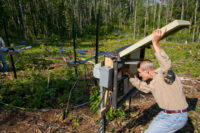
Climate change
Sep 12, 2022Even relatively modest climate warming and associated precipitation shifts may dramatically alter Earth’s northernmost forests, which constitute one of the planet’s largest nearly intact forested ecosystems and are home to a big chunk of the planet’s terrestrial carbon.
Learn more about this study -

Football Super-fan
Sep 5, 2022Words cannot express Art Vuolo Jr.’s passion for Michigan football, but his massive archive says it all. This season marks Vuolo’s 43rd year recording the Wolverine game-day experience, from on-the-field action and untelevised half-time shows to on-the-field awards ceremonies and rare moments in the booth. Vuolo’s collection is slated for the Bentley one day.
Learn more about Vuolo’s archives -
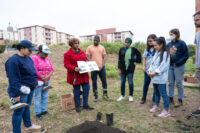
Urban planning
Aug 29, 2022U-M urban planning students have been working closely with low-income communities to help combat Brazil’s severe affordable housing deficit and promote environmental stewardship.
Learn more about this work -

Welcome Back
Aug 22, 2022The excitement in the air in Ann Arbor is palpable. U‑M students are back in town and ready to start the new school year. There are a variety of Welcome Week events happening across campus to help students get back into the swing of things.
View the 2022 Welcome to Michigan events
Go Blue! #WelcomeHome -
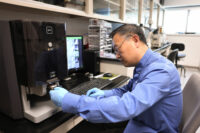
EV battery testing
Aug 15, 2022Testing the longevity of new electric vehicle battery designs could be four times faster with a streamlined approach, researchers at U-M have shown. Their optimization framework could drastically reduce the cost of assessing how battery configurations will perform over the long haul.
Learn more about this research -
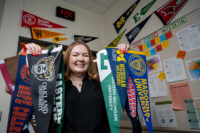
College confidant
Aug 8, 2022Through the Michigan College Advising Corps a diverse group of recent U-M graduates works full-time as college advisers in under-served high schools throughout the state of Michigan to help students navigate every aspect of the college application process and identify their best fit among post-secondary options.
Learn more about this program -
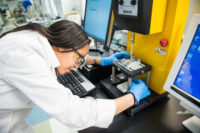
New drug delivery
Aug 1, 2022A new study from U-M describes one of the first entirely new drug delivery microencapsulation approaches in decades. Microencapsulation in biodegradable polymers allows drugs such as peptide therapeutics to be released over time in the body.
Learn more about this research -
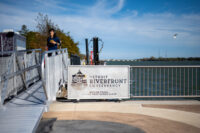
Detroit’s Riverwalk
Jul 25, 2022The Detroit Riverfront Conservancy was created in 2003 with the mission of developing access on the Detroit River. The entire vision is 5.5 miles of riverfront from the Ambassador Bridge to Gabriel Richard Park just east of the Belle Isle Bridge, and includes the construction of a continuous RiverWalk along with plazas, pavilions and green spaces.
Learn more about this transformation

